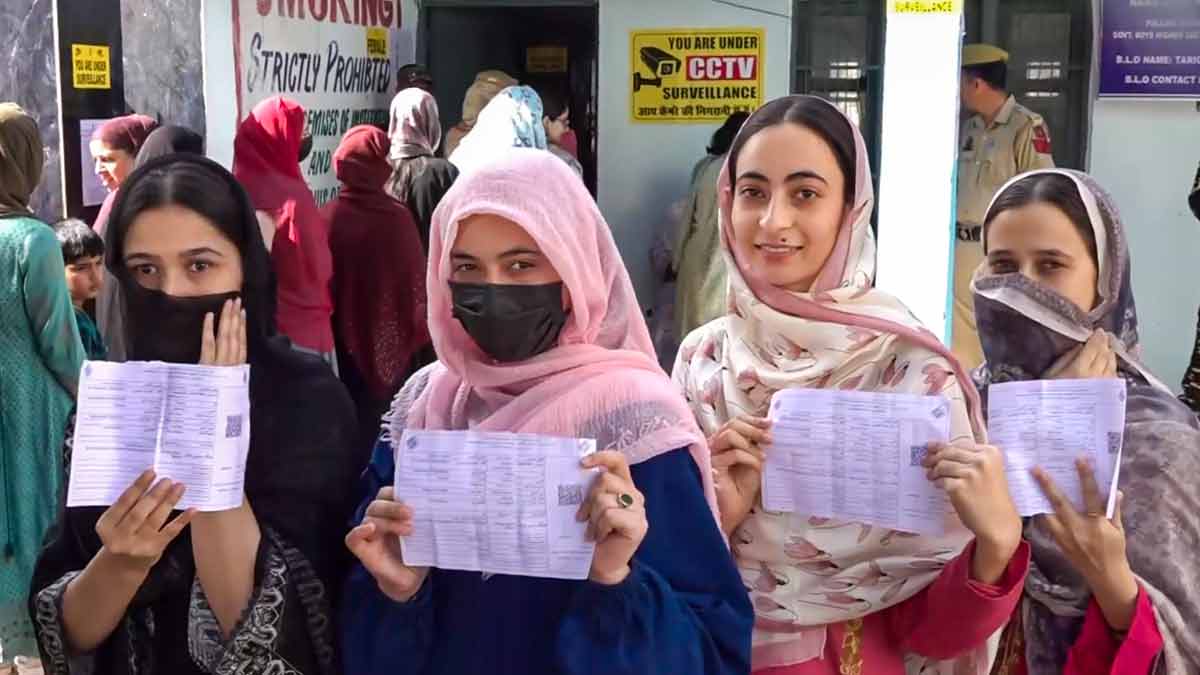Amid great excitement among voters, the first of the three-phase assembly elections, being held for the first time in 10 years, recorded 59 per cent polling in Jammu and Kashmir on Wednesday.
Jammu and Kashmir’s Chief Electoral Officer P. K. Pole said that the first phase of elections was held peacefully, recording 59 per cent polling, with a possibility of a fractional increase to the figure.
"Total poll percentage for the first phase of Assembly polls was 59 per cent, with a fractional increase very much possible. This time, we worked out district-wise figures, as earlier, one Assembly constituency was spread across two districts. Post delimitation exercise, no Assembly constituency is spread across two districts," Pole said, addressing a press conference in Jammu.
He said the polling percentage came from 3,276 polling booths and 23 special polling booths—19 in Jammu and four in Delhi for migrant voters.
“The election department of J&K has worked out percentage figures from districts. I am glad to share that the South Kashmir districts have witnessed a huge voter turnout. The areas in South Kashmir would otherwise witness a low percentage, even in single digits. Since the Lok Sabha polls were held in April-May, the voting percentage from South Kashmir districts has increased significantly," the J&K CEO said.
"I am sure that in the next two phases, the voting percentage will be much higher than today."
The second phase will be held on September 18, the third on October 1, and the results will be out on October 8.
Polling began at 7 am and was initially slow but picked up as the day progressed.
In the first phase, 24 assembly seats—16 in South Kashmir’s Pulwama, Shopian, Kulgam, and Anantnag, and eight in Jammu’s Ramban, Doda, and Kishtwar—witnessed elections.
Some of the notable candidates in the first phase included M. Y. Tarigami of CPI(M) (Kulgam), Iltija Mufti, daughter of PDP president Mehbooba Mufti (Bijbehara), prominent PDP leader Waheed Parra (Pulwama), former JKPCC and Congress General Secretary G. A. Mir (Dooru), independent candidate from the banned Jamat-e-Islami Sayed Ahmed Reshi (Kulgam), and Dr. Talat Majid (Pulwama). Former JKPCC chief Vikar Rasool was a candidate from Banihal.
Voter enthusiasm was evident at all the polling booths, with men, women, young, old, and first-timers showing up to cast their votes. Across all booths, people were unanimous in stating that there was a need for a representative government, irrespective of who comes to power.
Most voters avoided talking about Article 370 and said they came to vote for development, employment, and against growing inflation.
"Voting is a must, and youth have come forward to bring change," said Irfan Ahmed Mir in Bijbehara, Anantnag. "Whoever was in the government in the past did nothing, so youth have come forward to ensure there is employment and development, which has stagnated over the last decade or so."
Another voter, Rubeena Hamid, who was waiting in a queue, said she was voting for the second time in her life. "I want there to be a government that connects with the people."
Showkat Ahmed Dar expressed similar sentiments at Damhal Hanjipora. "Development in our area has stopped for the past many years," he said. "The past government also didn’t do much, so we have come to vote for the development of our area."
The National Conference (NC) and the Congress have formed an alliance against the BJP, with both sides vying for dominance. Other parties, including the People’s Democratic Party (PDP), Altaf Bukhari’s JK Apni Party (JKAP), Sajad Lone’s People’s Conference (PC), and Engineer Rashid’s Awami Itehad Party (AIP), are also in the fray.
Rashid, who won the Baramulla Lok Sabha constituency and led in 15 of the 18 assembly segments, was released on bail ahead of the polls to campaign for his party. The NC and the PDP have alleged that Engineer Rashid was released by the BJP to fragment the votes in the Valley and help the BJP stitch an alliance after the polls. However, the AIP leader denied the allegations, citing his victory in the Lok Sabha polls against NC Vice President Omar Abdullah and PC president Lone.
The AIP has fielded candidates across Kashmir, much to the chagrin of the NC and PDP. He has also collaborated with the JeI, which has influence in pockets across Kashmir. However, AIP's influence in the first phase seems negligible, and the contest was mainly between the NC-Congress alliance, the PDP, and some independents.



